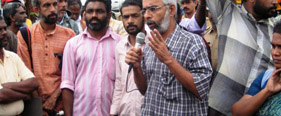Will tourism rise to human rights challenge?

Locals march against irresponsible tourism in Kerala
Tricia throws down gauntlet to industry at WTM: no-one wants to go on a holiday if they know they are abusing human rights
At last week’s WTM Tourism Concern launched a new briefing urging the global tourism industry to take a human rights approach to doing business.
Tricia Barnett, Director of Tourism Concern, said: “As one of the world’s largest services industries and a proclaimed driver of sustainable development, the tourism industry must now engage with human rights.”
“This presents new challenges, but also new opportunities. Integrating respect for human rights into company policies and activities is not only the ‘right’ thing to do, it makes businesses sense by mitigating risk and ensuring social licence to operate”.
The briefing, Why the tourism industry needs to take a human rights approach: The business case, calls on the sector to recognise that true sustainability can only be realised if the development and operation of tourism is embedded upon a respect for human rights. This includes the rights of marginalised communities in destinations who often suffer the negative impacts of tourism development.
“No one wants to go on holiday thinking that they are part of a process that could be abusing human rights. Of course they would never know. Human rights abuses are hidden.”
“Who would think that the water that’s filling their pool might mean that locals can’t access clean water for themselves? We hold governments responsible when they fail to uphold the rights of their citizens.”
“ And we hold the travel businesses responsible when they don’t pay due care to respect human rights. There is an onus on them to ensure that they are not complicit in rights violations. Our new report highlights new thinking in this area and seeks to begin a dialogue on how to move forward”, says Barnett.
The responsibility to respect requires companies to recognise their potential to contribute to human rights abuses both directly and through their supply chains. Companies can manage the risks that this entails by undertaking due diligence. This means engaging with affected individuals and communities so that adverse impacts can be addressed.
At last week’s World Travel Market, business deals worth millions were struck. Thousands of tourism products spanning countless destinations were bought and sold.
However, these destinations are peoples’ homes, and these people, their cultures, and the environment, are what make the places so alluring for us to visit. All must be protected, if tourism is to be sustainable and its benefits equitably shared. A human rights approach offers the industry a framework for playing its part in this regard.
Get a copy of the briefing HERE
Valere Tjolle
Valere is editor of the Sustainable Tourism Report Suite 2011 Get your copy at a special offer price: HERE
Tourism Concern case study: Bekal Special Tourism Zone, Kerala, India
Bekal, in the southern Indian state of Kerala, became India’s first Special Tourism Area in the 1990s. The Bekal Resorts Development Corporation Ltd (BRDC), a government agency formed to facilitate the development, has since acquired 250 acres of land for six resorts.
- Whilst the BRDC claims to be environmentally sensitive and socially responsible, the reality has seen lack of transparency and consultation with communities, violations of coastal regulations, and aggressive land acquisitions.
- Many local people claim to have been threatened with eviction if they refused to sell their land, often with little notice. This includes very poor fisher families who were forced into selling for as little as 25 per cent of the market rate.
- Women were allegedly threatened whilst their husbands were at sea. More than a year after their forced displacement, promises to rehabilitate them are unfulfilled. Land for building new homes remains flooded, the rental accommodation provided is of poor quality, and rents BRDC said it would pay are in arrears.
- The right to a livelihood has been undermined as the distance to the sea makes fishing unviable, while promised jobs at the resorts have not materialised.
- The right to water and sanitation have also been undermined, as the communities must travel 1.5 kilometres to access safe drinking water. The houses are subject to flooding during heavy rains, exacerbating already poor sanitary conditions and undermining the right to health.
- Various national laws have allegedly been violated by the BRDC and developers, including the Coastal Regulation Zone (CRZ) notification, the Wetland Conservation Act and the Environment Protection Act. The developers have reportedly destroyed mangroves, reclaimed wetlands, diverted rivers and appropriated agricultural land.
- Because of the alleged human rights abuses and legal transgressions, the Bekal development has attracted significant civil society opposition. This has included public campaigning and mass protests. Social tensions and resentment even led to some local people reportedly issuing warnings to tourists to stay away.
:
 United Kingdom
United Kingdom United States
United States Asia Pacific
Asia Pacific












































Dozens fall ill in P&O Cruises ship outbreak
Turkish Airlines flight in emergency landing after pilot dies
Boy falls to death on cruise ship
Unexpected wave rocks cruise ship
Woman dies after going overboard in English Channel